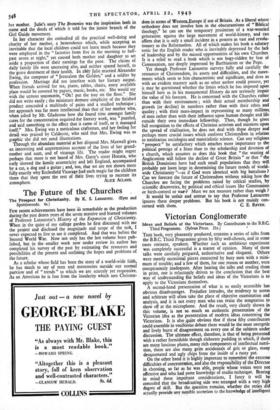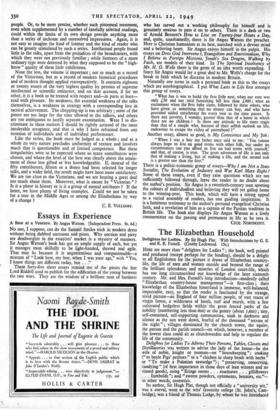Victorian Conglomerate
THIS book, very pleasantly produced, contains a series of talks from the B.B.C. Third Programme given by fifty well-chosen, and in some cases eminent, speakers. Whether such an ambitious experiment was completely successful is a matter of opinion. Many of these talks were carefully prepared, authoritative and eloquent. Others were merely occasional pieces concocted by busy men with a mini- mum of trouble; and a few of them, for one reason or another, were conspicuously inadequate. After hearing the talks and reading them in print, one is reluctantly driven to the conclusion that the best way of understanding the beliefs and ideas of the Victorians is to apply to the Victorians themselves.
A second-hand presentation of what is so easily accessible has obvious disadvantages. Prejudice intrudes, the tendency to assess and arbitrate will often take the place of objective examination and analysis, and it is not every man who can resist the temptation to show off at the microphone. And the result, very clearly shown in this volume, is not so- much an authentic presentation of the Victorian idea as the presentation of modern ideas concerning the Victorians. It is also guite obvious that if these fifty contributors could assemble in vociferous debate there would be the most energetic and lively burst of disagreement on every one of the subjects under discussion. The ultimate effect, therefore, is that of being presented with a rather formidable though elaborate pudding in which, if there are many luscious plums, many rich components of intellectual nutri- tion, there are also many grim accidentals of grit or glass, many desquamated and ugly chips from the inside of a rusty pot.
On the other hand it is highly important to remember the extreme difficulties of concentration, and also the responsibility of the Director in choosing, so far as he was able, people whose voices were not offensive and who had some knowledge of studio technique. Bearing in mind these impoitant considerations, I fancy it will be conceded that the broadcasting side was arranged with a very high degree of skill. But the question remains, whether the series did actually provide any notable accretion to the knowledge of intelligent
people. Or, to be more precise, whether such piecemeal treatment, even when supplemented by a number of Carefully selected readings, could within the limits of its own design provide anything more than a series of inchoate and unresolved impressions. Again, it is not easy to imagine the kind of listener and the kind of reader who can be greatly stimulated by such a series. Intellectual people found little in the talks, apart from the prejudices of the broadcasters, with which they were not previously familiar ; while listeners of a more ordinary type were deterred by what they supposed to be the " high- brow " quality of these little exhibitions.
None the less, the volume is important ; not so much as a record of the Victorians, but as a record of modern historical procedures and of modern thought applied retrospectively. It contains eighteen or twenty essays of the very highest quality by persons of supreme intellectual or scientific eminence, and on that account, if for no other, it is a book to be treated with respect and—in parts at least— read with pleasure. Its weakness, the essential weakness of the talks themselves, is a weakness in strategy with a corresponding loss in tactical achievement. The chopping-up is too arbitrary ; some of the pieces are too large for the time allowed to the talkers, and others are too ambiguous to justify separate examination. Were I to dis- criminate in these matters I should be rightly accused of the most intolerable arrogance, and that is why I have refrained from any mention of individuals and of individual performance.
Like the series, the book must be judged as a whole ; and as a whole its very nature precludes uniformity of texture and involves much that is questionable and of limited competence. But these irregularities were to be expected where so many contributors were chosen, and where the level of the best was clearly above the attain- ment Of those less gifted or less knowledgeable. If, instead of the fifty contributors, fifteen or a dozen had been selected for longer talks, and a wider field, the result might have been more satisfactory. We are too close to the Victorians, and we are hearing a great deal too much about them. Moreover, what is meant by " Victorian " ? Is it a phase in history or is it a group of mental attributes ? If the latter, we have plenty of living examples. Could we not be taken for a tour in the Middle Ages or among the Elizabethans by way of a change ?
C. E. VULLIAMY.



































 Previous page
Previous page